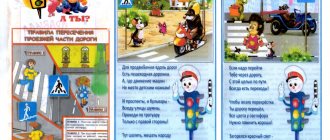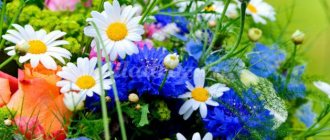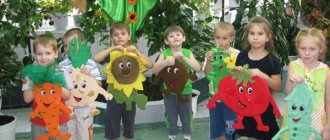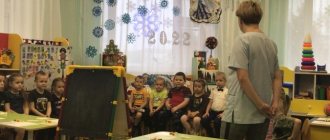Summary of the parent meeting in the middle group on the topic: “Let's get to know each other!”
Dear parents, I would like to introduce you to the daily routine in our group and ask you to follow it. Acceptance of children up to 8. . Our morning exercises start at 8:00, so I ask you to bring your children before 8:00 – 8:00. Then there is breakfast and classes begin. If you are late and arrive during class, wait until the class ends... Familiarize yourself with the rules for visiting the preschool educational institution
.
For music and physical education classes, a uniform and shoes are required.
Get acquainted with the network of classes
Organized activities for children are carried out in the following educational areas:
“Cognitive development” - develop interest in the world around us, form ideas about objects, their characteristics and the materials from which they are made; generalize knowledge about public transport; about traffic rules; about your hometown (city name, home address); we will introduce you to indoor plants, trees, fruits, berries, mushrooms, birds, insects, wild and domestic animals, birds; sequence of seasons.
We will develop knowledge about geometric shapes, study the number series, solve logical problems and much more.
“Speech development” - be able to name words that begin with a certain sound; coordinate words in a sentence, understanding their meaning; the ability to describe objects and toys; tell from the picture; write short stories.
“Social and communicative development” - to form a caring attitude towards your family, towards kindergarten, towards your hometown (village); develop a child’s positive attitude towards himself, his peers, adults and the world around him.
“Artistic and aesthetic development” - develop children’s ability to listen to works of different genres and themes (fairy tales, stories, poems), involve children in predicting familiar works, memorizing poems, proverbs, sayings;
Develop interest in visual arts. Reinforce the techniques of painting with gouache paints, introduce them to the features of working with watercolors. Improve the ability to draw lines and rings with the entire bristle of the brush, and also learn to draw dots, lines, and rings with the end of the brush. Learn to draw a circle.
“Physical development” - consolidate skills in basic types of movements and enrich the child’s motor experience; develop physical qualities: speed, endurance, agility, etc.; develop organization, independence, and initiative in children.
Familiarizing parents with the goals and objectives of the preschool educational institution for the new school year.
Educational activities correspond to the approximate basic educational program of preschool education “Mosaic Park”,
according to which our kindergarten operates. Developed in accordance with the requirements of the Federal State Educational Standard for Preschool Education (FSES DO), approved by the Order of the Ministry of Education and Science of the Russian Federation dated October 17, 2013, Moscow, edited by Victoria Yuryevna Belkovich, Natalya Valentinovna Grebenkina.
Parent meeting No. 2 in the “Rainbow” middle group, class hour (secondary group)
Parents' meeting No. 2
The role of the family in the speech development of the child.
Protocol No. 2
Parents' meeting of the secondary group "Rainbow" of the Nizhnedevitsky kindergarten dated December 12, 2021.
There were 16 people present.
.Preliminary work. Preparation of exhibition materials: Fiction for reading to children, didactic speech games, a selection of illustrative material to enrich the vocabulary.
Agenda:
1. Introductory part. 2. Workshop. 3. Pedagogical comprehensive education “Characteristics of speech of children in the fifth year of life.” 4. Game part. 5. Final part.
On the first issue, teacher Kupriyanova Yu.M. spoke. 1. Hello, dear parents, today we have gathered to discuss with you an important and relevant topic today: “The role of the family in the speech development of a 4-5 year old child.” We bring to your attention an exhibition of fiction, didactic games for speech development (for the development of sound pronunciation, the syllabic structure of words and the formation of lexical and grammatical categories), illustrative material for enriching the dictionary.
2.Workshop. a) Discussion of factors for successful speech development of a child. We invite you to select the most significant factors from the list and comment on your choice. (There are cards with text on the tables). 1.Emotional communication between parents and children, starting from infancy. 2. Communication of the child with peers. 3.Structure of the articulatory apparatus 4.Speech of adults - sample. 5.Development of fine motor skills of the hands. 6.Reading fiction to children. 7.Child's play with adults and peers.
b) Analysis of problem situations. Situation 1. While observing children, educators and specialists from all preschool services noticed that children’s answers when looking at illustrations and pictures may be different depending on how the adult formulates the question. It’s good when an adult’s question prompts the child to give a more complete answer. Question. — Suggest how five-year-old children will answer the following questions. Choose the most successful one - What is painted in the picture? (list the objects depicted) - What are the children doing in the picture? (describe the picture) - What did the artist talk about in his picture? (they will try to interpret the picture) Situation 2. The preschooler does not ask the adult questions at all, or asks them, but very rarely. Question. — What, in your opinion, could be the reasons? (sample answer) This may be caused by the child’s lack of necessary knowledge and stable selective interest in something. Perhaps, before, when a child turned to an adult with questions, he was met with irritation or criticism from the adult, which hurt his pride. Situation 3. Vova learned to speak early. He is now six years old. His speech is well developed. True, he does not draw, does not sculpt, and does not strive for this. But his parents believe that he will study well, because he thinks like an adult. Question. — Assess the position of the parents. Is it possible to foresee the results of the exercise? (sample answer) In productive types of children's activities, the child learns to set a goal, make efforts to achieve a result, and compare it with the goal. Drawing and modeling classes contribute to the development of fine motor skills of the hand, which creates the prerequisites for mastering writing.
3. Teacher Nokhrina G.F. offered parents several recommendations. Speech is not inherited; the child learns the experience of verbal communication from the adults around him. Speech acquisition is directly dependent on the speech environment surrounding the child. Therefore, it is so important that he hears correct, competent speech at home. Parents should know that an important aspect of speech development is the correct pronunciation of sounds. Errors in pronunciation are the basis of many school difficulties. In addition, with unclear diction and an insufficient level of speech development, children are reluctant to communicate with peers and adults. Please note: a 4-5 year old child must pronounce all sounds correctly. If this is not the case, do not waste time, do not hope that speech impediments will disappear by themselves. The best thing to do is to turn to a speech therapist for help; do not forget that his communication with you is crucial for the development of spoken language in preschoolers. During walks with your children, try to draw their attention to objects that are significant to people: shops, schools, clinics, libraries. Tell your child what these institutions are for, who works in them. While walking in a park, square, or on a pond, attract the child’s attention to the beauty of the surrounding nature, plants and animals, insects. Do not shy away from answering your child’s questions. When introducing new objects, things, objects, name them correctly. Offer to look in detail, highlight the characteristic features, properties, teach him to observe, compare objects and phenomena. We advise you to start a children's library at home, where you can look at illustrations in books and encyclopedias for children together with your child. It is necessary to introduce children to folklore, tell and read fairy tales, riddles, songs, nursery rhymes. They not only introduce children to the national culture, but also form moral qualities: kindness, honesty, caring for another person, entertain and amuse, make them want to speak out, talk about the heroes of a fairy tale. Support this desire, let your child tell a familiar fairy tale to his sister or grandmother ,your favorite toy. These are the first steps in mastering monologue speech.
4.Teacher Yu.M. Kupriyanova offered entertainment. Conducting speech games, exercises, and tasks is beneficial for family communication and the development of the child’s speech. We will play some games now. (Appendix No. 1)
5. Final part.
Appendix No. 1 GAMES FOR THE DEVELOPMENT OF LEXICAL AND GRAMMARICAL CATEGORIES FOR MIDDLE PRESCHOOL CHILDREN WITH ODE VIOLATIONS goals • to exercise in the selection of words - synonyms (close in meaning), words - antonyms (opposite in meaning), words - paronyms (similar in sound) “DISAGREE” “The teacher invites the children to name the opposite of the ones he names. For example: • I think the eagle flies very low, what do you think? No, the eagle flies high. • There is black snow on the road. No, there is white snow on the road. • After rain the sand is dry. No, after the rain the sand is wet, etc. goals • enrich and activate vocabulary on lexical topics • develop attention, thinking, oral speech “EXPLANATIONS” The teacher asks the child any word, and he, in turn, explains the meaning of the word, how understands what it means. You need to start working with simple words, gradually moving on to more complex words. For example: what is a store (bicycle, wig, etc.) goals • to develop the skill of using masculine, feminine and neuter nouns in the prepositional case with the ending – “e” • to activate vocabulary on the topic “animals”
"WHO LIVES WHERE?"
The teacher displays pictures of animal dwellings on the board and asks the children to answer the question: “Who lives (or winters) where?” • a cow lives in a barn • calves live in a calf barn • pigs live in a pigsty • rabbits live in a rabbitry • a fox lives in a hole • a bear winters in a den • a mouse lives in a hole • horses live in a stable • a squirrel lives in a hollow • a hedgehog lives in a nest • the wolf lives in the lair. The endings of word forms are highlighted.
goals • develop understanding and formation of the skill of using masculine nouns in the genitive case with the ending “a”, “ya”, feminine nouns with the ending “s”, “i” • activate the vocabulary of subjects on the topic “animals”
“WHOSE’S TAIL? WHOSE FACE?
Children select pictures of animals laid out on the table and carefully watch the presenter, who demonstrates the body parts of these animals. The presenter asks: “Whose tail is this?” .The child should say: “This is the tail of a fox. I have a fox,” etc.
goals • to develop the skill of using feminine nouns in the instrumental case with the ending “oh”, “ey” • to activate the vocabulary of subjects on the topic “berries”
"PIE FILLING"
The teacher invites the children to bake a pie. Everyone chooses the filling of the pie themselves. For example: • I will bake a pie with cranberries • I will bake a pie with raspberries • I will bake a pie with strawberries • I will bake a pie with currants • I will bake a pie with plums.
goals • to develop the skill of using masculine dative nouns with the ending “u”, “yu”, feminine nouns with the ending “e” • to activate the vocabulary on the topic “pets”
“MAKE SENTENCES FROM THE PICTURES”
The teacher offers children plot pictures for visual perception. Children independently compose sentences based on the pictures, highlighting the ending of the word form. For example: • a girl gives hay to a goat • dad gives food to a pig • dad mows the grass for a cow • mom pours milk for the cat • a boy throws a bone to the dog
Non-traditional parent meeting in the middle group at the beginning of the school year
Parent meeting in the middle group in a non-traditional form “Journey to the Land of Childhood”
Goal: expanding contact between teachers and parents; improving the pedagogical culture of parents. Objectives: consider the age and individual characteristics of children 4-5 years old; introduce the tasks of the preschool institution for the new school year; to intensify the work of parents on the development of children's speech. Agenda: 1. Age characteristics of children 4-5 years old 2. Correction of disorders in the development of speech in preschool children 3. Preparation for the New Year
Progress:
- Hello, dear parents!
Thank you for taking the time to come to the meeting. Today we will play and travel to the country of “Childhood”. And we will travel on a horse. We sat on the horse (straightened the back)
, galloped off
(clicked our tongue)
.
Stop “Liubimochka” (We stop the horse by exhaling air with vibrating lips).
- Do you love your children?
Do you know them? We'll check this now. (The teacher places a flower on the board, on the petals of which the developmental features of a 4-5 year old child are written:
- the desire for independence - the formation of ethical ideas - the development of creative abilities - fears, as a consequence of the development of a vigorous imagination - interaction with peers - active curiosity - speech development - need for movement - interest in letters, numbers - impressionability
The teacher gives comments on each petal.
If parents notice this tumor in their child, they take one heart “handout.” Dear parents!
If you have collected as many hearts as there are flower petals, your child is developing normally. If there are few petals, or none at all, this may be a delay in mental development and you should see a psychologist. Let's gallop further. We sat on the horse (straightened the back)
and galloped off
(clicking our tongue). Stop “Igralochka” (We stop the horse by exhaling air with vibrating lips). One of the tasks of our kindergarten is the correction of speech development disorders in preschoolers. And now let's play speech games. The teacher plays games with parents on:
- agreement of nouns and adjectives in gender, number, case - use of prepositions - development of facial expressions, breathing, articulatory and finger motor skills - development of phonemic hearing These games can be played at home.
And we moved on.
We sat on the horse (straightened the back) and galloped off (clicking our tongue). Stop “Surprise” (We stop the horse by exhaling air with vibrating lips). New Year is ahead. Children remember events if they are bright and exciting. Our task is to make the holiday unforgettable. (Parents discuss options for holding the holiday, choosing gifts and surprises).
Our journey has now ended.
Please rate our work. If you learned something new and came to the meeting for a reason, put a green smiley face; if you think you wasted your time, put a red smiley face. If something is in between – yellow. Thanks everyone for your work.
We recommend watching:
Summary of the parent meeting in the middle group of the kindergarten Parent meeting in the middle group of the kindergarten Summary of the parent meeting in the middle group Minutes of the parent meeting in the middle group
Similar articles:
The first parent meeting in the middle group at the beginning of the school year
Parent meeting in the middle group. Additional education in kindergarten
Parent meeting in the middle group. The role of grandparents in raising children
Parent meeting in the middle group. Preserving the psychological well-being of the child in the family
Parent meeting in the middle group on the topic “Healthy lifestyle”




